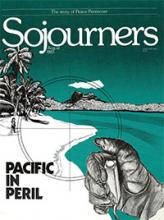Oh, honest Americans, as Christians hear me for my downtrodden people! Their form of government is as dear to them as yours is precious to you. Quite as warmly as you lore your country, so they love theirs. Do not covet the little vineyards of Naboth so far from your shores, lest the punishment of Ahab fall upon you, if not in your day, in that of your children, for "be not deceived, God is not mocked." The people to whom your fathers told of the living God, and taught to call "Father," and whom the sons now seek to despoil and destroy, are crying to Him in their time of trouble; and He will keep His promise, and will listen to the voices of His Hawaiian children lamenting for their homes.
These words were written in Washington, D.C., at the turn of the century by the Hawaiian Queen Lili'uokalani, who believed that Americans meant what they said about justice for all. For those who know the bitter history of the U.S. annexation of Hawaii nearly 100 years ago, the words must burn like coals of fire. Shortly after this moving plea was penned by the beloved leader of Hawaii, a coalition of American planters, entrepreneurs, and ambitious descendants of the first white missionaries in Hawaii, with the backing of U.S. Marines and the complicity of Washington, successfully seized power in the islands.
A few years later, the American surrogate administration "ceded" Hawaii to the United States, and the islands and their people saw the systematic destruction of their way of life. Today Hawaii is a firm American center of tourism and military might. It is a paradise lost, and it is a microcosm of what the colonial aspirations of Western powers have done to the inhabitants of what the early explorers dubbed "the peaceful ocean."
Read the Full Article

